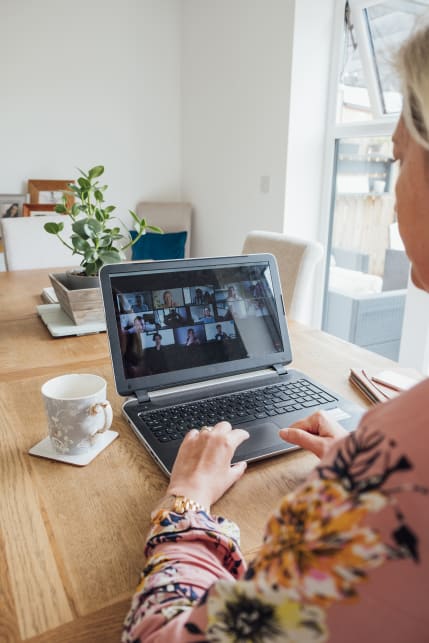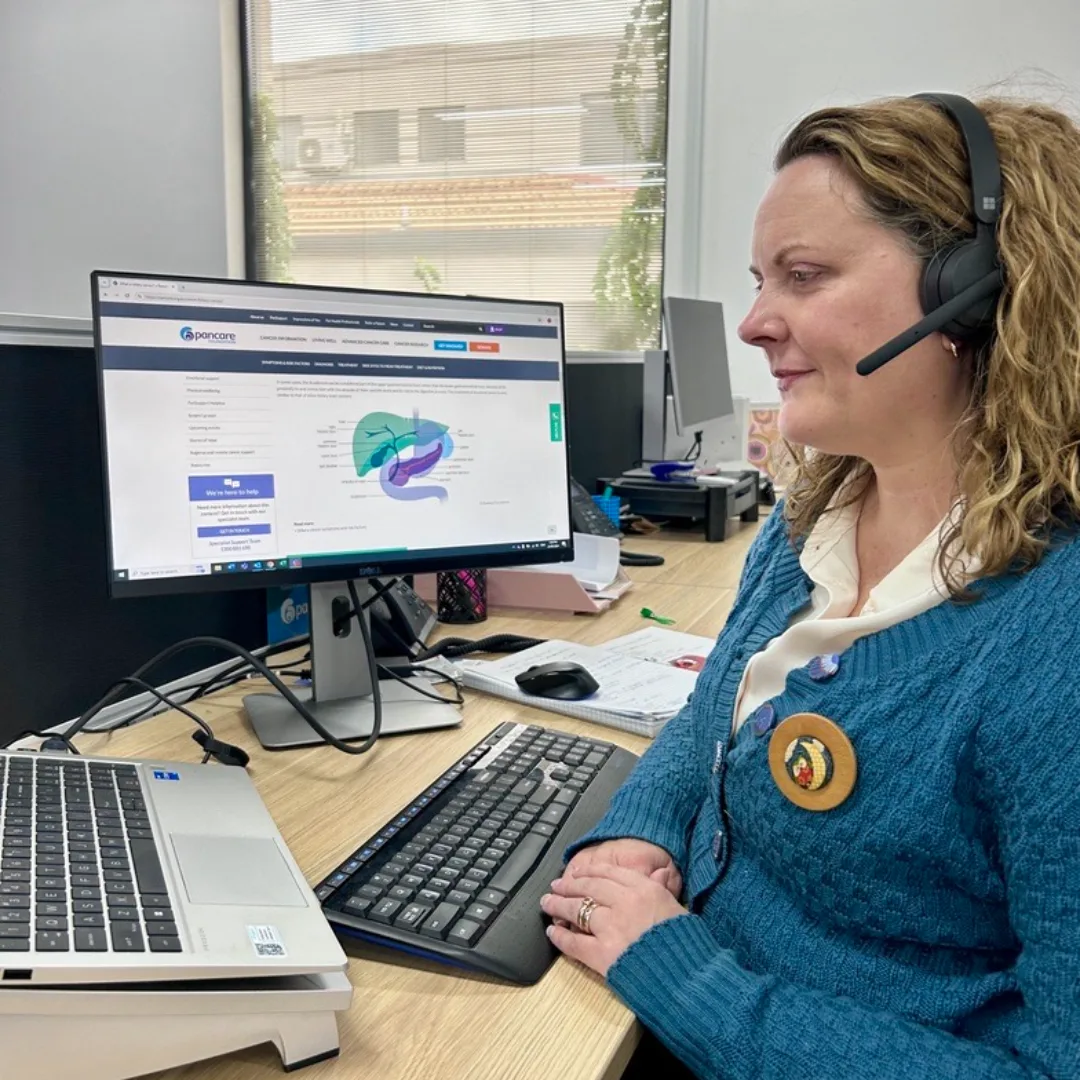Living with stomach cancer
A diagnosis of stomach cancer affects more than just your physical health. It affects how you eat, your energy levels, your emotions, and the practical details of daily life.
Living well with stomach cancer means adapting to digestive changes, looking after your emotional wellbeing, nuturing your relationships, and finding ways to do the things that bring meaning to your life.
This section provides practical guidance to help you navigate the day-to-day realities of stomach cancer, from managing symptoms to caring for your mental health, and finding the support you need.
Managing symptoms and side effects
Your stomach is a central part of your digestive system. When you have stomach cancer, eating and drinking can become challenging. The side effects of treatment can make things even harder.
Some days will feel harder than others. Understanding what’s happening and learning how to manage your symptoms and side effects can make a big difference in how you feel.
Most of these symptoms can be managed with the right care and support. Your healthcare team is there to help with these issues. They’re all a normal part of living with stomach cancer and its treatment.

Digestive challenges after stomach surgery
If you’ve had part or all of your stomach removed, your digestive system will work differently, and it takes time to adjust.
Dumping syndrome
Dumping syndrome can happen when food moves too quickly from your food pipe or remaining stomach into your small intestine. This occurs because surgery may remove the pyloric sphincter (the valve that normally controls how food leaves the stomach).
- Early dumping usually happens 10–30 minutes after eating and can cause nausea, cramps, diarrhoea, or a fast heartbeat.
- Late dumping occurs 1–3 hours after eating and can cause sweating, dizziness, weakness, or shakiness as blood sugar levels drop.
Tips to manage dumping syndrome:
- Eat small amounts every 2–3 hours instead of three large meals
- Avoid sugary foods and drinks
- Include some protein with each meal
- Drink fluids between meals, not during
- If you feel unwell after eating, lie down for 15–20 minutes (unless reflux is a problem)
- Keep a food diary to learn what triggers your symptoms
Most people improve as their body adapts, though some symptoms may last longer. Your dietitian can help you find eating patterns that work best for you.
Reflux and heartburn
Reflux and heartburn are also common after stomach surgery. This happens because the valve that normally keeps food and acid from moving back up may not work as well.
Tips to manage reflux:
- Stay upright for at least 30 minutes after eating
- Raise the head of your bed with blocks or a wedge pillow
- Avoid fatty, spicy, or acidic foods, chocolate, caffeine, and mint
- Eat your last meal a few hours before bed
- Wear loose clothing around your waist
- Take acid-reducing medicines if prescribed
Feeling full quickly
Feeling full quickly (early satiety) is another common issue. Because your stomach is smaller, it’s harder to eat enough at one time.
Tips to stay nourished:
- Choose foods that are rich in energy and nutrients
- Eat six or more small meals or snacks a day
- Include protein and healthy fats in each meal
- Have supplement drinks between meals if needed
- Avoid filling up on liquids before eating
Malabsorption and enzyme deficiency
After stomach surgery, food may pass through your digestive system too quickly, or skip parts where nutrients are normally absorbed. This can make it harder for your body to get what it needs from food. Your pancreas may also make fewer enzymes that help break food down.
Signs of poor absorption include:
- oily, floating stools that smell bad
- frequent or loose bowel movements
- bloating or gas
- oil visible in the toilet
- trouble gaining weight
- feeling very tired.
If you notice these symptoms, tell your doctor. You may need enzyme capsules (such as Creon®) to help your body digest food. These are taken with meals and snacks. Your dietitian will help you work out the right dose for you.
You’ll also need to replace some vitamins and minerals, such as:
- Vitamin B12 (usually by injection) – your body can’t absorb this properly without stomach acid
- Iron – to prevent anaemia
- Calcium and vitamin D – for strong bones
- Vitamins A, D, E and K – if you’re not absorbing fat well.
Regular blood tests help your doctor check your levels and adjust supplements as needed.
Other common side effects
Nausea and vomiting
Feeling sick can happen because of the cancer itself, your treatment, or changes to your digestion after surgery.
Tips to manage nausea
- Take your anti-nausea medicines exactly as prescribed. They work best if taken early
- Choose bland foods such as toast, crackers, rice, bananas or applesauce
- Try ginger tea, ginger biscuits, or ginger capsules
- Avoid strong food smells – cold foods often smell less
- Get fresh air or sit near an open window
- Try acupressure wristbands from your pharmacy
- Distract yourself with gentle activity, music or TV
- Rest after eating, but stay sitting upright if you also have reflux
Call your healthcare team if you vomit for more than a day, can’t keep food or fluids down, or see blood in your vomit.
Fatigue
Feeling very tired is common for people with stomach cancer. It can be caused by the cancer itself, treatments, poor nutrition, low iron or B12, or simply the effort of coping with illness.
Tips to manage fatigue:
- Focus on what matters most each day
- Rest when you need to – pushing through makes tiredness worse
- Try light exercise, such as short walks, when you have more energy
- Accept help from others with meals, chores or errands
- Keep a regular sleep routine
- Eat small, frequent meals to keep your energy steady
- Ask your doctor to check for anaemia or vitamin deficiencies
If tiredness stops you from caring for yourself or gets worse suddenly, speak to your doctor – there may be a treatable cause.
Pain
Stomach cancer can cause pain or discomfort in your upper abdomen, especially after eating. Surgery and treatment can also cause pain as your body heals.
Pain relief isn’t just about comfort. Controlling pain helps you eat, sleep, and recover better.
Pain relief options include:
- mild pain medicine such as paracetamol
- stronger prescription medicines if needed
- anti-inflammatory drugs (if suitable for you)
- medicines for nerve pain
- special procedures like nerve blocks
- radiotherapy to shrink tumours causing pain
Tell your doctor or nurse if you have pain. Describe where it is, how strong it feels (for example, 0–10), what makes it better or worse, and how it affects your day. Don’t wait until pain gets severe — medicine works best when taken early.
When to seek help
Contact your healthcare team immediately if you experience:
- a temperature above 38°C, especially during chemotherapy
- Severe abdominal pain
- vomiting that stops you from eating, drinking, or taking medicines
- Signs of dehydration (very dark urine, dizziness, dry mouth, not urinating often)
- Black, tarry stools or visible blood in vomit or stool
- Sudden severe weakness or confusion
- Difficulty breathing
- Chest pain
These symptoms might indicate complications requiring prompt medical attention.
Your emotional and mental health
A diagnosis of stomach cancer can be life changing. It’s important to take care of your emotional and mental health and you come to terms with your diagnosis and how treatment may affect your daily life.
Your emotions
It's normal to experience a range of emotions after a stomach cancer diagnosis. These feelings can change from day to day, but they are all normal.
You might feel:
- shock and disbelief, especially when first diagnosed
- fear and anxiety about treatment, the future, or cancer coming back
- angry at the unfairness of the situation
- sad about changes to your life and future
- guilty about being a burden on others or about past lifestyle choices
- a loss of control, like cancer is controlling your life
- hope when treatment goes well or you have good days
- gratitude for support from loved ones and healthcare teams.
Ways to support your emotional wellbeing
There are many strategies than can help you manage the emotional impact of living with stomach cancer. What works for someone else may not always work for you. It is important to keep this in mind during your treatment.
Talk about your feelings. Keeping feelings bottled up typically intensifies distress. Share with trusted friends or family, join a support group <Hyperlink to 5.6>where others truly understand, or talk with a counsellor via the PanSupport Helpline. <Hyperlink to 5.6> Saying difficult things aloud often lessens their power.
- Keep some routines. Cancer can turn life upside down, but holding onto small routines, like going to bed and waking up at the same time, can bring a sense of calm and control.
- Be kind to yourself. You’re going through something really difficult. Treat yourself the way you would treat a friend, with patience and compassion. Rest when you need to, let yourself cry, and celebrate small wins.
- Take breaks from cancer information. It’s natural to want to learn about your illness, but constantly reading online or searching for statistics can make anxiety worse. Try setting limits on how much time you spend researching.
- Find small moments of joy. Even on hard days, small pleasures can lift your spirits. Try watching a funny movie, listening to music, sitting in the sun, or cuddling a pet. These little things matter.
- Try relaxation or mindfulness. Deep breathing, gentle stretching, meditation or guided imagery can help ease stress and improve sleep. Many hospitals offer relaxation classes, or you can try free apps at home.
- Stay connected. When you don’t feel social, it’s easy to pull away. But staying in touch helps. A short visit, text, or video chat can remind you that you’re supported and not alone.
- Move your body when you can. Even a slow walk or some gentle stretching can boost your mood and energy. Movement helps both your body and mind feel stronger.
When feelings become overwhelming
While it's normal to feel anxious, sad, or worried, sometimes these feelings can become overwhelming. You might need extra support if you're feeling very anxious or worried most of the time.
Signs that you might need extra help from your healthcare team include:
- difficulty sleeping or sleeping too much
- loss of interest in things you usually enjoy
- difficulty concentrating or making decisions
- withdrawing from family and friends
- feeling hopeless about the future
- having physical symptoms like a racing heart, difficulty breathing, or panic attacks
- having thoughts of self-harm all mean you should reach out for help.
If you're experiencing any of these, please talk to your healthcare team, GP, or a counsellor. Help is available, and you don't have to cope alone.
Fear of cancer returning
After finishing initial treatment for stomach cancer, many people worry about the cancer coming back. This is a normal fear.
It’s important to focus on follow-up care and the things you can control rather than what you can't.
Talking about your worries can help and connecting with others who understand these fears can be reassuring.
If this fear is affecting your daily life, talk with your healthcare team.
Diet and nutrition
After stomach cancer treatment (especially surgery) eating will feel different.
Your stomach and digestive system now work in a new way, so you’ll need to think about what you eat, how much, and when.
These changes take time and patience. It might feel hard at first, but with help from your care team, you can find new eating habits that keep you healthy and strong.
Why is nutrition different after stomach cancer?
The stomach normally:
- stores food for a short time
- mixes it with acid and enzymes to start digestion
- slowly passes small amounts into the intestines.
After surgery these jobs are partly or completely gone. That means:
- you can’t eat big meals. Your stomach is smaller or may be gone completely.
- Food can move too quickly or too slowly.
- Hunger and fullness signals change.
- Some nutrients are harder to absorb.
Fundamental eating principles after gastrectomy
To stay well, you’ll need to eat differently, not because you’re doing anything wrong, but because your body now works differently.
- Eat small amounts often. Forget the idea of three meals a day. Try eating five to eight small meals or snacks spread across the day. Even a few bites count.
- Focus on protein and healthy fats. These foods give you energy and help your body heal. Include foods like eggs, meat, fish, dairy, beans, nuts, and seeds. Use healthy fats such as olive oil, avocado, or nut butters.
- Don’t drink with meals. Liquids fill up your smaller stomach and can make food move too quickly. Try to drink 30–60 minutes before or after eating, not during.
- Choose foods that pack in nutrients. Every bite matters. Pick foods full of vitamins, minerals, protein, and healthy fats. Avoid sugary drinks and heavily processed snacks.
- Chew slowly and carefully. Take small bites and chew well to help digestion and avoid discomfort.
- Keep a food diary. Write down what you eat and how it makes you feel. You’ll soon see which foods work best for you.
Managing common nutrition challenges
Getting enough protein can be hard after surgery, but it’s very important for healing and strength.
Try to:
- start each meal or snack with protein.
- choose high-protein foods like meat, eggs, cheese or fish.
- add protein powder to smoothies or soups.
- keep easy protein snacks on hand (nuts, cheese, boiled eggs, protein bars).
- use nutrition drinks if you struggle to eat enough.
Vitamin and mineral supplements are often needed for life because your body can’t absorb nutrients the same way.
Your doctor may recommend:
- Vitamin B12 injections every few months.
- Iron tablets to prevent anaemia.
- Calcium and vitamin D for strong bones.
- A daily multivitamin.
Your blood will be tested regularly to check your levels.
Weight changes are common.
- Many people lose weight easily after surgery. Eat more often, choose higher-calorie foods (like full-fat dairy or adding butter or oil), and use nutrition drinks between meals.
- Some people gain weight if they eat lots of easy-to-digest carbs or become less active. If that happens, your dietitian can help you balance your meals.
Practical meal-planning tips
- Stock up on foods that are easy to eat and full of nutrients — things like eggs, cheese, cooked chicken, tinned fish, yoghurt, nut butters, and hummus.
- Prepare meals ahead when you feel well and freeze them in small portions.
- Adapt favourite foods instead of giving them up — eat half portions or separate components.
- Set eating times. You might not feel hungry even when you need food, so aim to eat something every 2–3 hours while awake.
- Stay flexible. During treatment or nausea, stick to what you can manage — soft foods, smoothies, or bland meals. Once you feel better, return to your usual plan.
Working with a dietitian
A dietitian who understands stomach cancer can make a big difference. They can help you:
- understand your body’s new needs
- plan meals that fit your lifestyle
- manage symptoms like dumping, reflux, or feeling full quickly
- work out enzyme or supplement doses
- prevent nutrition problems before they start.
Ask your healthcare team for a referral to a dietitian. This is one of the most important things you can do to help yourself feel better.

Living well with stomach cancer
Stomach cancer doesn’t have to stop you from living a meaningful and full life.
While acknowledging the challenges, finding ways to stay active, maintain relationships, and engage in activities that bring satisfaction helps you feel more like yourself and improves both physical and emotional wellbeing.
Living well doesn't mean pretending everything is fine or maintaining your pre-cancer pace. It means identifying what matters most to you now and finding adapted ways to pursue those things.
Physical activity and exercise
When you’re dealing with stomach cancer and its treatments, exercise might feel impossible or unimportant. But gentle movement can actually help you feel better. Research shows that the right kind of activity can:
- boost your energy and reduce tiredness
- help keep your muscles strong
- lift your mood and improve sleep
- support digestion and appetite
- even help your body respond better to treatment.
This isn’t about hard workouts or gym goals. It’s about moving in ways that feel right for you.
After surgery, start small and take your time. Walking is one of the best choices. Even short walks of a few minutes at a time can help your body heal and regain strength.
During chemotherapy, your energy may change from day to day. On good days, you might walk a little further or do light exercise. On tired days, even gentle stretching or a slow lap around the house counts. The goal is to move your body most days, not to push yourself too hard.
Ideas for gentle activities
- Walking outdoors or inside (like at a shopping centre)
- Swimming or water exercises (once your surgical wounds are fully healed)
- Gentle yoga or tai chi for balance and flexibility
- Using light weights or stretchy bands to keep muscles strong
- Stationary cycling
- Gardening or dancing
- Playing with children or grandchildren
Working with professionals
An exercise physiologist or physiotherapist who understands cancer care can help you build a safe and effective plan. They can adjust your program as your condition changes to make sure you’re exercising safely and getting the most benefit.
You can ask your healthcare team for a referral to an exercise professional.
Relationships
Stomach cancer can affect your relationships in many ways. Physical changes, tiredness, stress, treatment, and changes in eating can all affect how you connect with your partner, family, and friends.

Talking to loved ones
Share how you’re feeling and let people know how they can help. You don’t need to protect others by hiding your emotions. It’s okay to talk about everyday things. Not every conversation has to be about cancer.
When relationships feel strained
People who care about you often want to help but may not know how. Some might hover too closely, while others stay away because they feel unsure. The best way to help them support you is to talk openly and clearly about what you need.
You might say things like:
- “I’d love help with grocery shopping on Thursdays.”
- “Can we talk about something other than cancer for a bit?”
- “Just sitting together without talking really helps.”
You can also explain your eating needs so people understand and don’t pressure you:
- “I’m eating what I can manage right now. Please don’t worry if it’s not much.”
- “I may leave the table after a few bites, but I’d love to come back to chat.”
Intimacy and sexuality
Cancer and its treatments can affect your interest in sex and physical closeness. You might feel too tired, sore, or anxious. Changes in your body, such as scars or weight loss, can also make you feel self-conscious. These are very common feelings, and they do not mean something is wrong with you.
Tips that may help
- Talk honestly with your partner about what feels okay and what doesn’t.
- Remember that intimacy isn’t only about sex. Touch, hugs, and closeness can be just as important.
- Choose times when you feel rested or less unwell.
- Speak with your doctor if pain, nausea, or other side effects make intimacy hard.
- A counsellor or sex therapist can help if these changes cause stress in your relationship.
Intimacy needs change over time. Be kind to yourself and keep communication open.

Staying social when eating is hard
Because food is a big part of most social events, eating differently can make gatherings feel awkward. But staying connected is important for your wellbeing.
Try these ideas:
- Meet friends for activities that don’t revolve around food, like going for a walk, to a park, movie, or gallery.
- If you’re meeting for a meal, eat a little beforehand and focus on the company, not the food.
- Host get-togethers at home where you can plan the food and timing.
- Let close friends know your situation in a simple way so they understand and don’t worry.
- Pick restaurants where you know there’s something small or soft you can eat.
Remember: your friends and family care about you, not what or how much you eat. Staying connected helps you feel supported and less alone.
Finding meaning and purpose
Many people find comfort in spending time on things that matter most – whether that’s hobbies, family, faith, creativity, or being in nature.
You might enjoy gentle yoga, meditation, music or art therapy, reading, gardening, or spiritual activities.
Small moments of joy can make a big difference.
Practical support during stomach cancer
Stomach cancer brings financial strain, employment challenges, and logistical complications alongside medical issues. Addressing these practical concerns reduces stress, allowing you to focus energy on treatment and recovery.
Help exists for many of these challenges. Accessing support requires navigating systems and asking for assistance. Neither easy when you're unwell, but both worthwhile.
Work and employment
Your diagnosis will affect your ability to work, even if it is only temporarily such as when having treatment.
It's important to talk to your employer about your diagnosis and likely time off work, any adjustments you might need, and your rights and entitlements.
Your options may include taking sick leave, reducing your hours, working from home, making changes to your role or duties, taking extended leave, or leaving work temporarily or permanently.
If you can't continue working, consider what income support you're entitled to, whether you can access your superannuation early, whether you have income protection insurance, and what other financial support is available.
Financial support
Cancer treatment can be expensive. Even with public healthcare, out-of-pocket costs for medications, appointments, parking, travel, and time away from work add up quickly. Financial worry adds significantly to overall stress.
There are government programs and community supports that can help reduce the financial burden.

Government assistance
You may be eligible for payments through Services Australia, such as:
- Sickness Allowance (for temporary inability to work)
- Disability Support Pension (for longer-term situations)
- Carer Payment or Carer Allowance (for family members caring for you)
Contact Services Australia (132 300) to discuss eligibility and application processes.
The National Disability Insurance Scheme (NDIS) supports people under 65 with permanent disability impacting daily activities. Stomach cancer effects might qualify you, particularly if long-term eating difficulties significantly impair functioning.
Other supports
- The Medicare Safety Net reduces out-of-pocket costs for medical services once you reach certain thresholds. Register your family at Medicare to track spending automatically.
- The Pharmaceutical Benefits Safety Net similarly reduces medication costs after you've spent a certain amount annually. Keep receipts from all PBS prescriptions to claim your safety net earlier.
- If you’re struggling with loan or credit payments, contact your bank early to discuss payment relief options
- In some cases, you may be able to access superannuation early on medical grounds. Speak to your fund, accountant or the Australian Taxation Office before applying.
A qualified financial planner can help you review your income, super, and insurance. You can find an accredited adviser through the Financial Planning Association of Australia.
Pancare also provides limited financial assistance for eligible patients and carers. Call 1300 881 698 or email support@pancare.org.au.
Legal considerations
It can feel confronting, but getting your legal documents in order gives peace of mind and helps your loved ones understand your wishes.
- A power of attorney is a legal document that lets someone you trust make decisions on your behalf if you become too unwell to do so. This can cover financial, legal, and personal matters, including health-care decisions.
- A Will sets out what happens to your property, finances, and personal items after your death. It can also include guardianship plans for children and your preferences for funeral arrangements.
- Estate planning means organising your assets, debts, and wishes ahead of time so everything is clear and simple for your loved ones.
- An Advance care plan lets you record your preferences for future medical treatment. You can write these in an Advance Care Directive (sometimes called a “living will”), which only takes effect if you are unable to make or communicate decisions yourself.
Where to get help
Managing the practical side of cancer can feel overwhelming, but you don’t have to do it alone.
You can:
- Talk to a social worker or cancer care coordinator at your treatment centre
- Call Pancare Foundation on 1300 881 698 or visit pancare.org.au/living-well
- Contact the Cancer Council on 13 11 20 for advice on financial, legal, or work-related issues

Support and resources
You don't have to face stomach cancer alone. Many services and resources are available to support you and your family.
Pancare Support
Pancare Support is Pancare Foundation's dedicated support service for people affected by upper gastrointestinal (GI) cancers, like stomach cancer.
- Pancare Support Helpline is available Monday to Friday, 9am to 5pm. You can speak with a specialist upper GI nurse. You can book an appointment or alternatively call 1300 881 698.
- Pancare Support Groups are online or face-to-face support groups for people living withan upper GI cancer. You can share experiences with others who understand and learn from others' experiences.
- Carer Support Groups provide support for carers and family members. These are held online on the last Thursday of each month from 11am-12:30pm (AEST).
- Specialist Presenter-led Groups are monthly combined patient and carer groups that feature specialist presenters on topics like diet, managing side effects, and survivorship. These are held online on the third Thursday of each month from 11am-12:30pm (AEST).
- Financial assistance: Financial support is available for eligible patients, carers, and families. This can help with costs like medical equipment, bills, and specialist services.
- Educational resources: Pancare Foundation provides information booklets and guides, online resources, and a Living Well Series with expert information.

Cancer Council support groups
Cancer Council provides Australia-wide cancer information and support services, accessible regardless of cancer type.
The 13 11 20 Information and Support Line operates Monday to Friday, 9am-5pm, with trained consultants answering questions about cancer, treatment, services, and providing emotional support. Translation services are available for non-English speakers.
Telephone Support Groups run by Cancer Council NSW are free, professionally facilitated groups you can join from home. Relevant groups include:
- Stomach Cancer Support Group
- Advanced Cancer Support Group (for people with cancer that has spread)
- Carers' Support Group (for family members and friends)
Contact Cancer Council on 1300 755 632 or email tsg@nswcc.org.au for information about joining these groups.
Cancer Connect matches you one-on-one with someone who has experienced similar cancer. Speaking with someone who's been through stomach cancer treatment provides unique understanding and practical insights.
Legal and financial information through Cancer Council includes guidance on entitlements, managing costs, workplace rights, and legal issues. Their website offers downloadable resources and contact details for further assistance.
Your healthcare team
Your healthcare team is a key source of support. Don't hesitate to contact them with questions or concerns.
- Specialist cancer nurses provide information and education, help coordinate your care, offer emotional support, and are available for questions between appointments.
- Social workers can help with practical issues, connect you with financial support, provide emotional support and counselling, and help you navigate the healthcare system.
- Dietitians give specialist advice on nutrition, help with managing eating difficulties, provide advice on enzyme supplements, and offer ongoing nutritional support.
- Psychologists or counsellors provide support for emotional and mental health, teach strategies for coping, support you with anxiety and depression, and are available for you and your family.
- Exercise physiologists or physiotherapists design safe exercise programmes, help maintain strength and fitness, and support physical recovery.
- Pain specialists provide specialised pain management when pain is difficult to control.
- Palliative care teams help with symptom management and support for quality of life. They're available earlier than many people think - not just for end-of-life care. They can work alongside your cancer treatment team.
Online resources and information
Stick to reputable sources when looking for information online. Be wary of miracle cures or treatments that sound too good to be true.
Check when information was published as medical knowledge changes over time.
Discuss anything you read online with your healthcare team before making decisions.
Some reliable online sources include:
- Pancare Foundation (www.pancare.org.au) provides information about stomach cancer, support services, research and clinical trials, and resources and booklets.
- Cancer Council (www.cancer.org.au) offers information about all types of cancer, booklets and fact sheets, and videos and webinars. They also have Optimal Care Pathways available to show patients what they can expect from best practice cancer care.
- For clinical trials information, visit australiancancertrials.gov.au (Australian Cancer Clinical Trials) or gicancer.org.au (Australasian Gastro-Intestinal Clinical Trials Group).
How to find support services
The best place to start is with your healthcare team. They can refer you to appropriate services based on your needs.
You can also contact Pancare’s Support Helpline to speak with a specialist Upper GI Cancer Nurse.
Call us on 1300 881 698 or simply send us an email support@pancare.org.au
Want to talk?
Speak to an upper GI cancer nurse or counsellor, we're here to provide you with the support you need. Support available to anyone impacted by upper gastrointestinal (GI) cancer. Monday to Friday, 9am-5pm.

